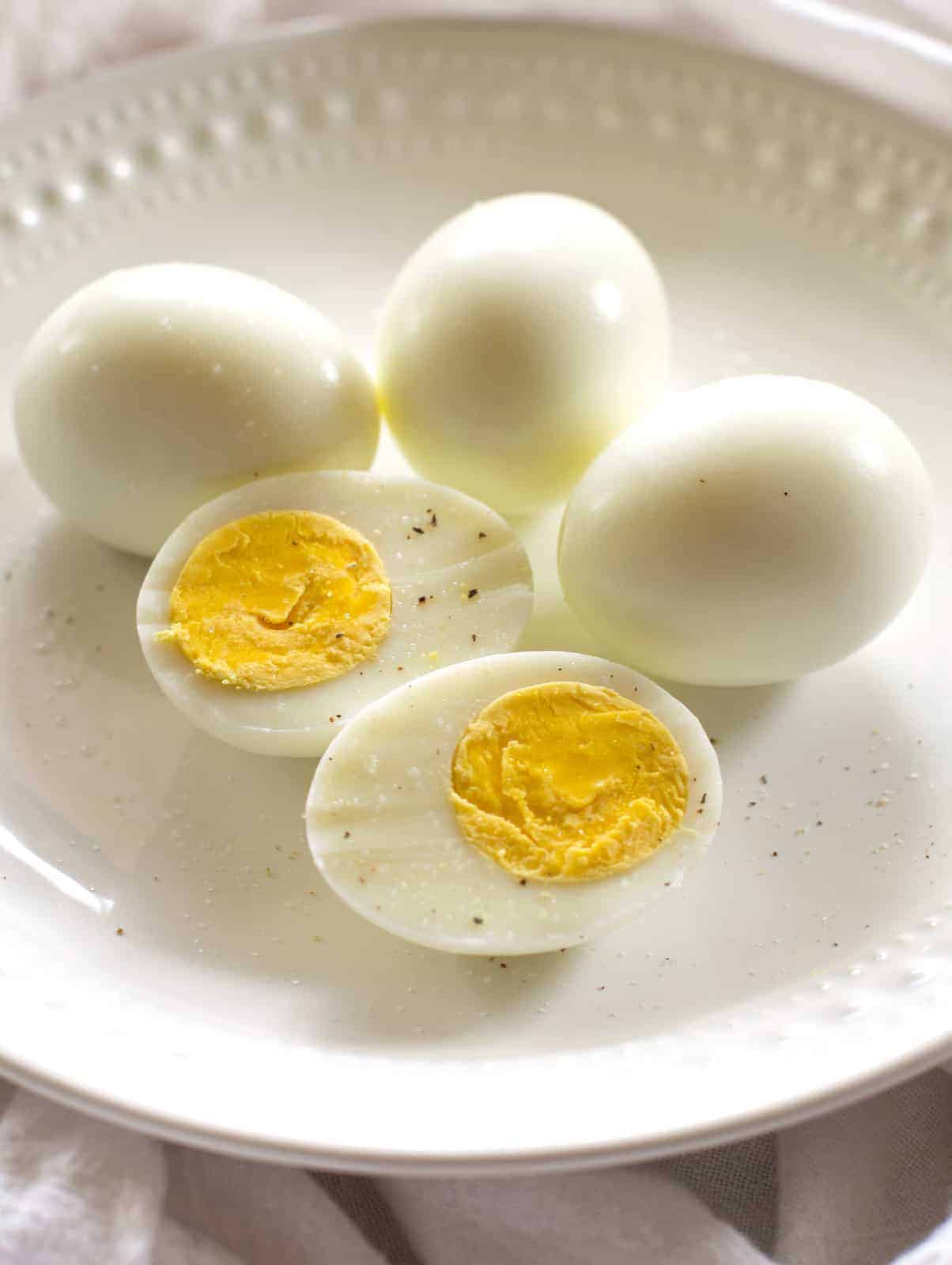Health & Wellness
Health benefits of boiled egg

Boiled egg is most versatile and nutritious food. It has different health benefits and it can be taken as breakfast, lunch, dinner and even as snacks.
Health Benefits of Boiled Eggs
- Rich in Protein:
Each egg provides about 6 grams of high-quality protein, which supports muscle repair, growth, and satiety. - Nutrient Dense:
Eggs contain essential vitamins and minerals, including:- Vitamin D: Supports bone health and immune function.
- Vitamin B12: Crucial for red blood cell formation and nerve health.
- Choline: Important for brain function and liver health.
- Supports Weight Management:
Boiled eggs are low in calories (about 70 per egg) but high in protein, which helps keep you full and reduce cravings. - Heart Health:
Despite past concerns about cholesterol, studies suggest moderate egg consumption does not increase heart disease risk in most people and may improve HDL (“good”) cholesterol levels. - Portable and Convenient:
Easy to prepare ahead of time, boiled eggs are a perfect grab-and-go option.
Ways to Incorporate Boiled Eggs into Meals
Breakfast Ideas
- Egg and Avocado Toast: Slice a boiled egg on whole-grain toast with smashed avocado.
- Egg and Veggie Bowl: Pair boiled eggs with sautéed spinach, cherry tomatoes, and mushrooms.
Lunch Options
- Egg Salad: Mash boiled eggs with a bit of Greek yogurt or mayonnaise, mustard, and herbs, and serve in a sandwich or lettuce wrap.
- Protein-Packed Salad: Top mixed greens with boiled eggs, grilled chicken, nuts, and a light vinaigrette.
Snacks
- Eggs with Dip: Serve boiled eggs with hummus, guacamole, or a sprinkle of chili powder and salt.
Dinner Ideas
- Egg and Grain Bowl: Combine boiled eggs with quinoa or brown rice, roasted veggies, and a drizzle of tahini dressing.
- Egg-Stuffed Peppers: Halve and hollow out bell peppers, fill with chopped boiled eggs and sautéed onions, and bake until warm.
Post-Workout Meal
- Pair boiled eggs with a banana or whole-grain crackers for a balance of protein and carbs.
Tips for Meal Prep with Boiled Eggs
- Batch Cooking: Boil a dozen eggs at the start of the week for easy meals and snacks.
- Peel Easily: Use slightly older eggs (7–10 days old) for easier peeling.
- Storage: Keep boiled eggs in their shells in the refrigerator for up to one week.
Potential Downsides
- Eating only boiled eggs without variety may lack fiber and other nutrients. Balance meals with veggies, whole grains, and healthy fats.
- Overeating eggs could contribute to high cholesterol for individuals sensitive to dietary cholesterol.
By pairing boiled eggs with other nutrient-rich foods, they can be a delicious and satisfying component of any meal!
Diet & Nutrition
What can you not eat with eggs?

While eggs are versatile and pair well with many foods, there are some combinations that might not be ideal due to potential digestive issues, reduced nutrient absorption, or cultural beliefs. Here’s a breakdown:
1. Foods That May Hinder Nutrient Absorption:
- Tea or Coffee: Tannins and polyphenols in tea and coffee can bind to iron in eggs, potentially reducing iron absorption.
- Soy Milk: Some enzymes in raw soy can interfere with the digestion of proteins in eggs, though this is mostly a concern when consuming raw or undercooked eggs with soy.
2. High-Fat Foods:
- Combining eggs with too many high-fat foods (e.g., bacon, sausage, or heavy cream) can be heavy on digestion, especially for those with sensitive stomachs or gallbladder issues.
3. Sugar in Excess:
- Cooking eggs with a lot of sugar, such as in custards, can form glycation end products, which are linked to inflammation and other health issues when consumed in excess.
4. Fish:
- In some cases, eating it and fish together may lead to digestive discomfort for certain individuals. However, this varies by person and is not a strict dietary rule.
5. Fruits High in Acids:
- Some people avoid eating eggs with highly acidic fruits (like citrus) as it can cause discomfort due to differences in digestion rates.
6. Cultural Taboos or Beliefs:
- Some cultures or traditional medicine systems suggest avoiding it with dairy, fish, or certain vegetables due to symbolic, energetic, or digestive principles.
Safe and Balanced Approach:
Eggs are generally safe and nutritious when eaten with a variety of foods, as long as the combination is balanced and suits your digestive system. If you experience discomfort with certain pairings, it’s best to avoid them based on personal experience.
Health & Wellness
Which food combinations enhance anti-inflammatory effects?
Health & Wellness
health benefits of glutathione

Glutathione is a powerful antioxidant produced naturally in the body and is also available as a supplement. It plays a crucial role in various physiological processes, offering several health benefits, including:
1. Antioxidant Defense
- Glutathione neutralizes free radicals and reactive oxygen species, protecting cells from oxidative stress, which can contribute to aging and chronic diseases like cancer, diabetes, and cardiovascular conditions.
2. Detoxification
- It supports the liver’s ability to detoxify harmful substances, including drugs, environmental toxins, and heavy metals.
3. Immune System Support
- It enhances immune function by promoting the activity of immune cells such as T cells and natural killer (NK) cells.
4. Skin Health
- It may improve skin tone and texture, offering potential benefits for hyperpigmentation and promoting a brighter complexion by inhibiting melanin production.
5. Anti-inflammatory Effects
- It can reduce inflammation by suppressing inflammatory cytokines, helping manage conditions like arthritis and inflammatory bowel disease.
6. Energy Production
- It plays a role in mitochondrial function, essential for energy production at the cellular level.
7. Neurological Health
- It supports brain health by reducing oxidative stress in the brain, potentially protecting against neurodegenerative diseases like Alzheimer’s and Parkinson’s.
8. Heart Health
- By reducing oxidative damage and improving vascular function, glutathione may lower the risk of atherosclerosis and heart disease.
9. Cellular Repair and Longevity
- It helps repair DNA damage and maintain the integrity of proteins and lipids, supporting cellular health and longevity.
10. Potential Cancer Prevention
- By combating oxidative stress and aiding detoxification, glutathione may reduce the risk of certain types of cancer.
How to Boost Glutathione Levels
- Dietary Sources: Foods like spinach, avocado, asparagus, broccoli, and garlic are rich in glutathione or its precursors.
- Supplements: Glutathione supplements or precursors like N-acetylcysteine (NAC) and alpha-lipoic acid can enhance levels.
- Lifestyle: Regular exercise, adequate sleep, and stress management can help maintain healthy glutathione levels.
Caution
- Excessive supplementation may disrupt natural glutathione production, so consult a healthcare provider before starting a regimen.
-

 Mental Health6 months ago
Mental Health6 months agoPet for mental health!
-

 Uncategorized9 months ago
Uncategorized9 months agoHow to do eyeliner for beginners in 2024
-

 Uncategorized9 months ago
Uncategorized9 months agoModern stylish abaya in 2024
-

 Fashion Accessories10 months ago
Fashion Accessories10 months agoSunglasses for All: The Guide to Choosing the Perfect Pair
-

 Diet & Nutrition5 months ago
Diet & Nutrition5 months ago100 calories of different nuts!
-

 Beauty & Skincare8 months ago
Beauty & Skincare8 months ago5 easy tips for doing manicure at home
-

 Uncategorized9 months ago
Uncategorized9 months agoHow to keep your hair beautiful and healthy.
-

 Uncategorized9 months ago
Uncategorized9 months agoThe Best 5 Elegant Abaya Dresses for Every Occasion in 2024













